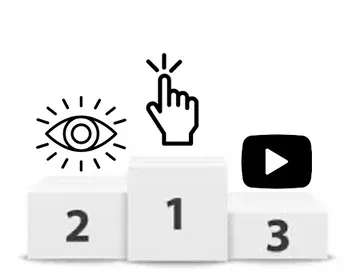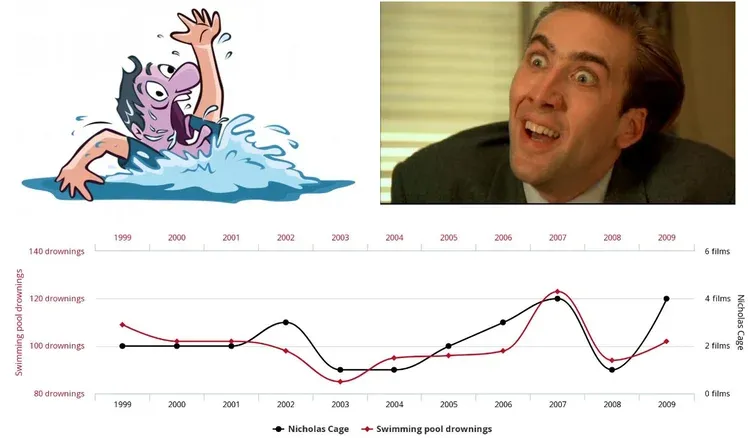Platform
Use Cases
Many Possibilities. One Platform.
AI and Automation
The Always-on Incrementality Platform
Solutions
Teams
Built for your whole team.
Industries
Trusted by all verticals.
Mediums
Measure any type of ad spend
Use Cases
Many Possibilities. One Platform.
AI and Automation
The Always-on Incrementality Platform
Teams
Built for your whole team.
Industries
Trusted by all verticals.
Mediums
Measure any type of ad spend
(And Nicolas Cage Is Not A Serial Killer)

A few years ago, an internet meme series popped up showing spurious correlations between random facts: Internet Explorer market share vs. US Murder, Marriage rate in Kentucky vs. People who drowned falling from a fishing boat, Ice Cream Sales vs. Shark Attacks , and more.
My favorite one is the strong correlation between the Number of films Nic Cage is on per year vs. the number of people who drown in pools. Nicolas Cage is truly a chameleon with over 100 films , but I doubt the relations to pool deaths. (unless? 🤨)

Correlation can be awkward. Confusing correlation with causation is natural.
But making hard business decisions based on it can easily lead to catastrophic losses.
In Marketing - the most common analogy to correlation vs. causation is: Budget Spend vs. New Sales.
And while unlike Nic Cage vs. Pool deaths – it’s is not as implausible - there have been numerous cases where an Advertiser dropped the budget spend to $0 , only to find out that their sales numbers didn’t change at all.
Could very well be.
It could be that all of the paid marketing activity was tracked, but in reality – had no impact over sales.
But it could also not be the case, as explained in the following example:
Does this example show that budget spent over Radio/TV was “fraud”? or does it mean that the media mix change shows that Billboard are the most valuable for this Advertiser ? and What if - during the first campaign, it was winter, while during the 2nd campaign, it was spring and more people saw the billboards than before?
Fraud is a term too often used incorrectly. Sometimes people confuse causation or correlation, when in reality, both factors may interact.
Could be. You may deserve an award.
If your brand reached a point where you no longer need to Advertise it to attract new customers - congratulations. You’ve done such an awesome job that you deserve an award for “Best Marketer in History!”
But then your competition starts taking the opportunity and before you know it, you are in your parent’s basement eating Cheetos from that once golden, now rusty, goblet saying “Best Marketer in History!”

Marketing is a continuous effort. Not an event. And when it comes to evaluating results, remember: correlation does not equal causation — stopping marketing completely often reveals the real drivers of incremental revenue.
Probably.
The current landscape of marketing heavily relies on giving 100% credit to whoever touched the user last.
It’s like starting a football team (“soccer” for the American readers) and paying only those who scored a goal.
The fact that player X scored the goal is undebatable. It is a fact.
But making a decision on how your team is constructed (or how your budget is mixed, if we drop the analogy) is making a data driven decision based on half the data, while ignoring the other half.
This is the essence of the debate around correlation and causation in marketing – and why so many campaigns are misattributed.
Most products marketing funnel requires more than a single interaction to cause users to convert. Let alone, to become paying customers.
Last touch attribution does not provide insights over causality – it only shows who was the last to generate a user click. And while there is great benefit in knowing this – it may only provide correlation, not causation.
A smart marketing data analyst will always ask whether we’re observing a causal relationship vs correlation, to avoid wasting budgets.
Utilizing causal Inference to measure the effect of paid marketing campaigns over user acquisition, allows a marketer to identify causation. Understanding causation helps a marketer know what is the value of campaigns, what the value campaigns have on one another, and which campaigns do not bring any value, but are taking credit for users that would use their product organically.

To apply Causal Inference to digital Advertising requires an understanding of the marketing world. Data in marketing is noisy. There are many internal and external factors influencing one another: seasonality, competition, featuring, weekdays, special days and so on. Marketers are often running campaigns across many countries and they need data to make decisions.
Applying causal inference in marketing is difficult. Reaching confidence may need active intervention in the marketing. It is impossible to isolate internal and external conditions, which is why a practical use of difference in difference (DID or DD) is applied in parallel with Shapley Value, a concept from cooperative game theory, to continuously provide actionable insights.
This is also where incremental marketing comes into play, since the focus is not just on correlation, but on driving measurable incremental outcomes.
If your attribution is your coach - making decisions in real time based on what you see.

Your Incrementality testing platform - is the team of data scientists analyzing the game in retrospect to help you build the ULTIMATE team.
INCRMNTAL is an incrementality testing platform providing ammunition to the digital marketer. The platform uses machine learning and AI to provide incrementality and cannibalization actionable insights acting as a strategic tool to unlock the value of your marketing budget.
And while correlation is not causation, the platform helps uncover where causality exists, ensuring smarter decisions that move beyond misleading metrics.
Because in marketing, correlation and causation both matter - but correlation does not equal causation, and only by understanding the difference can we unlock true growth.
If you want to learn more, visit INCRMNTAL or book a demo today!
Correlation means that two variables move together in some way, but it does not prove that one causes the other. Causation, on the other hand, shows a direct cause-and-effect relationship where one variable produces a change in the other. In short, correlation is about association, while causation is about influence.
In most cases, causation produces some form of correlation, but not all correlations are visible or strong. For example, a small effect of one factor on another may exist but be hidden within noisy data. So technically, causation without an observable correlation is possible when the relationship is weak or masked by other variables.
Correlation only shows that two things happen at the same time, not why they happen. Without controlled experiments or deeper analysis, you cannot know if one variable actually influences the other. External factors, known as confounders, may drive both variables, making the relationship spurious.
A famous example is the correlation between ice cream sales and shark attacks. Both increase during the summer, but eating ice cream does not cause shark attacks. The real cause is the seasonality factor; more people go swimming in summer, increasing the likelihood of both.
One reason is the possibility of a third variable influencing both factors. For instance, higher temperatures can cause both air conditioner sales to rise and electricity usage to spike, but air conditioner sales don’t cause the electricity demand. This illustrates why correlation alone cannot confirm a causal link.

Maor is the CEO & Co-Founder at INCRMNTAL. With over 20 years of experience in the adtech and marketing technology space, Maor is well known as a thought leader in the areas of marketing measurement. Previously acting as Managing Director International at inneractive (acquired by Fyber), and as CEO at Applift (acquired by MGI/Verve Group)